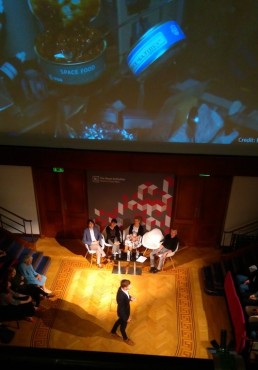07-Jun-2018
June Patron’s Night event was dedicated to the legacy and themes raised in the cinematic masterpiece 2001: A Space Odyssey.
The movie, due to its many exceptional qualities (stunning in-camera visuals, aesthetics, striking technological predictions (see astronauts’ using tablet computers in a movie from 1968), the rogue AI, lastly its philosophical layer) has never been entirely out of the popular discourse, but as of late it’s enjoying additional resurgence due to its rogue AI, HAL9000, appearing in each and every single conversation about AI in general, AI ethics, and AI threats.
The event was focused on some of the other themes of the movie, such as space exploration in general, space robotics, hibernation and cryonics, and the psychological aspects of space travel. RI always has great speakers, and this time was no exception.

The panel included:
- Marek Kukula, Public Astronomer at the Royal Observatory Greenwich, as the discussion host and moderator
- Calum Hervieu, space systems engineer with a focus on lunar exploration mission architectures and crew engineer for a Mars mission simulation in Hawaii.
- Professor Yang Gao, Associate Dean for Faculty of Engineering and Physical Sciences (FEPS) and the Professor of Space Autonomous Systems at Surrey Space Centre (SSC) and the Director of EPSRC/UKSA National Hub on Future AI & Robotics for Space (FAIR-SPACE).
- João Pedro de Magalhães, Institute of Ageing and Chronic Disease, University of Liverpool and coordinator of the UK Cryonics and Cryopreservation Research Network (http://www.cryonics-research.org.uk/), which aims to advance research in cryopreservation and its applications.
- Iya Whiteley, Director of the Centre for Space Medicine at Mullard Space Science Laboratory, UCL. She is a Space Psychologist, who worked on developing Tim Peake’s astronaut selection training programmes.
If the academic cred of the guests weren’t enough, Iya’s hobby is competitive skydiving, João is an amateur stand-up comedian, and Calum recreationally runs half-marathons. Try to compete with that.
The event paid tribute to Stanley Kubrick’s masterpiece and used it as a starting point for speakers’ individual short presentations. Rogue AI wasn’t one of them, and that’s a good thing, because there were enough interesting topics to discuss without it. Calum compared the scope and difficulty of lunar missions with the potential Mars mission, making it very clear how much more challenging the latter will be (if it ever happens…), and showed some concepts for human habitat on Mars (kudos to Foster+Partners for thinking about extraterrestrial markets so early in the game). Iya talked about the unique and numerous psychological challenges and considerations of a long-term (here defined as going to Mars and back, a couple of years altogether, including a minimum of 220 days in the space craft each way) space mission, some of which are difficult to relate to for ordinary people – e.g. the lack of sensation of wind or slightly varying temperature on one’s skin. Yang talked about UK’s ambition of becoming a leading player in space robotics, and the drive to enthuse the youngest generations to space exploration and robotics. João talked about hibernation and cryonics as they occur in some species of mammals and amphibians, and about ongoing research into both hibernation and cryonics of humans (mentioning Alcor, the cryonics company which first appeared on my radar in unforgettable “Future Fantastic” series hosted by Gillian Anderson many moons ago).
Presentations were followed by the usual Q&A, which was then followed by hands-on experiences, which aren’t usually the part of RI events. Attendees could see the impact of micrometeorites on space crafts, experience firsthand (literally) different rocket fuels, see what would happen to an unprotected human in the vacuum of space, or try the zero-G simulation chair. My favourite one were the rocket fuels, presented by charming and beautiful robot lady
Loved it!
